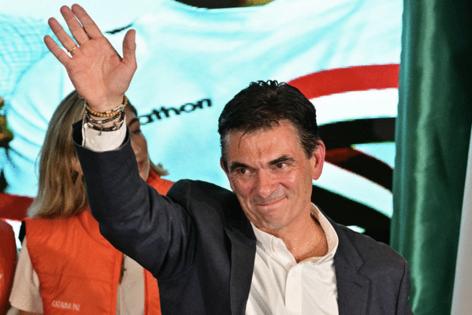Bolivia's next president targets pragmatic path out of crisis
Published in News & Features
LA PAZ, Bolivia — Fresh off winning Sunday’s election, Bolivian President-elect Rodrigo Paz is blazing a rare centrist path out of his country’s economic crisis, focusing on practical policies over ideological divisions engulfing its neighbors.
The folksy Paz maintains friendly terms with a range of politicians whose support he’ll need to rescue this landlocked nation from economic ruin. And he’s not shy about mending ties with the United States and other countries shunned by his predecessors. Amid scarce fuel and dollars, the stakes are high for Bolivia’s first centrist leader in a generation.
His victory drew a range of nods, notably a grudging acknowledgment from rabble-rousing former President Evo Morales at home and a hearty congratulations from Venezuela’s conservative opposition leader Maria Corina Machado abroad.
Heading into his Nov. 8 inauguration, Paz’s first test will be to replenish fuel supply that the outgoing administration of Luis Arce ran out of money to pay for. He plans to surge in fuel through deferred payments while awaiting dollar injections from multilateral lenders and other foreign sources, said José Gabriel Espinoza, economic adviser to his Democratic Christian Party, or PDC.
“You don’t need dollars when you make a deferred payment,” Espinoza told reporters Monday. “The problem with waiting for the dollars is that the fuel doesn’t arrive.”
Paz’s team is in talks with the U.S. as well as Brazil, Argentina, Paraguay and Uruguay to secure emergency supplies, Espinoza said.
“The U.S. is working with us to facilitate supply routes. The commitment was reaffirmed Sunday by Deputy Secretary of State Christopher Landau,” he said. The PDC is developing plans to set up a “stabilization fund” and allow the private sector to import fuel. In the meantime the task will be overseen by state-owned energy company YPFB.
The State Department didn’t immediately respond to a request for comment. However, the office released a statement congratulating Paz on his victory “after two decades of mismanagement.”
Bolivia normally imports fuel through neighboring Chile with which it broke diplomatic relations in 1978 because of a longstanding dispute over sovereign access to the Pacific.
Paz won Sunday’s runoff with 54.4% of the vote, defeating right-wing rival Jorge “Tuto” Quiroga of Alianza Libre, who conceded defeat.
“Bolivia is breathing winds of change,” Paz said in his victory speech Sunday night. He proclaimed the backing of three other parties in Congress — Libre, Unidad and Súmate — enabling him to pass laws to access international credit and reform the energy and mining sectors to attract foreign investment.
Paz hasn’t ruled out the possibility of resorting to the International Monetary Fund, a touchy recourse in Latin America because of orthodox policy trade-offs. In a Monday press conference, he said his team is already preparing an initial financial lifeline from regional development banks CAF and Fonplata.
“Gradualism requires time. Time requires financing. Financing requires credibility. And none of that is guaranteed,” wrote Jonathan Fortun senior economist at the Institute of International Finance.
“The question is not if Paz will turn to the IMF, but how long he can pretend not to,” Fortun added.
Bolivia could move to a single, market-driven dollar exchange rate by January, Espinoza said. He also mentioned plans to restructure government spending and halve this year’s estimated 10% fiscal deficit in 2026.
The Paz administration plans to rejuvenate Bolivia’s gas industry by reopening dormant production wells before implementing structural reforms, including possible changes to the state-oriented hydrocarbons law and even the constitution, Espinoza said.
“For the next six months things are going to look very positive. Many political actors in Bolivia are excited about the chance to move on from the MAS era,” said James Bosworth, founder of the political risk firm Hxagon. This honeymoon may not last long, he added, as political and personal differences emerge, possibly threatening the existing legislative coalition between Paz’s party and others.
Crucially, Morales accepted the runoff results, attributing Paz’s victory to his supporters’ votes. “Paz and Lara won with the evista vote,” he posted on X, referring to his supporters. “But that doesn’t give them a blank check. The new government must consult the people.”
Paz dismissed any formal alliance with Morales. When asked about the former president’s remarks, Vice President-elect Edmand Lara said only that the party is “grateful to everyone who supported us.”
Paz is likely to keep his distance from the coca leader who ran Bolivia for a turbulent 13 years.
“I think if Rodrigo Paz is smart politician, and he’s proven to be, he won’t form an alliance with Evo Morales,” Bosworth said.
In his victory speech Sunday night, Paz struck a pragmatic tone, a sharp contrast with the fiery “evista” rhetoric that lost popular resonance in recent years as hardship grew.
“Ideology doesn’t put food on the table,” Paz told jubilant supporters. “What does is the right to work, strong institutions, legal security and private property.”
But after two decades of socialist rule, weary Bolivians are longing for results.
“I know it won’t be easy, because of the way this government has left us,” said Yenny Rojas, 60, a street vendor in the political capital of La Paz. “He has a lot of work to do. God help him. It won’t be this year, maybe two years. We have to learn to wait.”
©2025 Bloomberg L.P. Visit bloomberg.com. Distributed by Tribune Content Agency, LLC.







Comments